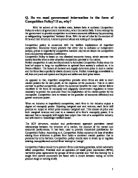In case of surplus, the government sometimes buys the extra produce to stock up in case of a drought situation in the future. This is extremely important for in a deficit situation, where not enough of the product is available, the government may release these goods in the market, relaxing the prices on the limited products available. Or as in the extract above, they may pass laws, banning exports of the product, and relaxing import duties.
One advantage of government involvement in the market, is that they impose duties on foreign items thereby protecting local industries. In the production of sugar for example, developed countries may possess state-of-the-art machines to convert the sugar-cane into sugar in the most cost-effective manner, and may thus be able to sell sugar in the world market at lower prices while retaining the same profit. In such cases, the government imposes taxes on such imported goods, so that the local producers can still cmpete with them.
Another very important function of the government is that it ensures that the local population is not at a loss in any possible way. Under a free-market economy, if the producers find it more profitable to export rather than sell their goods in the local market, they will have no qualms about doing so, even if there is shortage in the local market. The government, on the other hand, will ensure that there is adequate amount to satisfy local demand, before it is exported. This is especially important in the case of food products, especially, wheat, rice, sugar, which are part of the staple diet of the masses, and should be affordable to the poorest of the poor.
Although sugar is a necessity in most country, there are other food products, which may be in high demand, but are harmful for consumption, such as tobacco and drugs. In a free-market economy where profit motive reigns sovereign, the production of these goods will continue as long as there is demand. In such cases, too, government intervention is necessary; it may discourage the consumption of such products by imposing high taxes on it, for example.
Thus in conclusion, it may be said that government intervention is a blessing for the consumers and producers alike. Not only does this intervention ensure the direct well being of the masses, it also ensures other advantages- social benefits- by ensuring that the production of not just sugar and food products, but all goods, does not harm society in any way- environmentally, socially, through noise pollution, etc. On a cost-benefit analysis, the costs of government involvement are minimal compared to its advantages.







